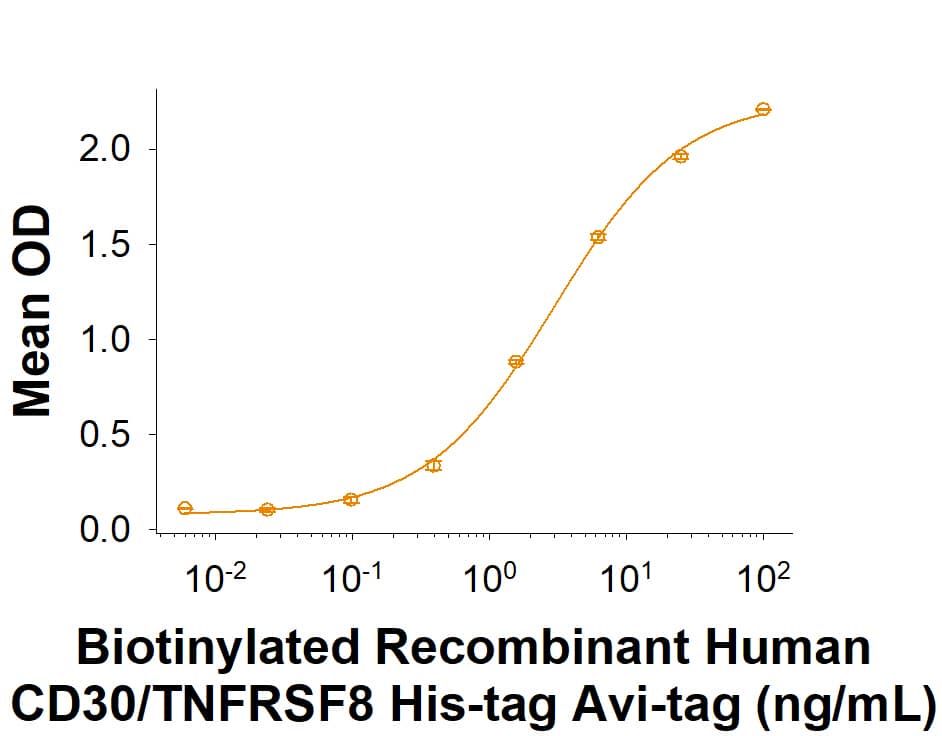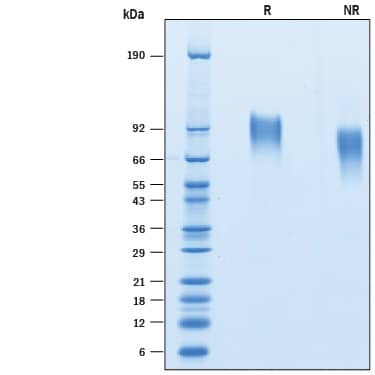Recombinant Human CD30/TNFRSF8 His-tag Avi-tag Protein, CF
Recombinant Human CD30/TNFRSF8 His-tag Avi-tag Protein, CF Summary
Learn more about Avi-tag Biotinylated ProteinsProduct Specifications
| Human CD30/TNFRSF8 (Phe19-Lys379) Accession # P28908.1 | HHHHHH | Avi-tag |
| N-terminus | C-terminus | |
Analysis
Product Datasheets
Carrier Free
CF stands for Carrier Free (CF). We typically add Bovine Serum Albumin (BSA) as a carrier protein to our recombinant proteins. Adding a carrier protein enhances protein stability, increases shelf-life, and allows the recombinant protein to be stored at a more dilute concentration. The carrier free version does not contain BSA.
In general, we advise purchasing the recombinant protein with BSA for use in cell or tissue culture, or as an ELISA standard. In contrast, the carrier free protein is recommended for applications, in which the presence of BSA could interfere.
AVI10239
| Formulation | Lyophilized from a 0.2 μm filtered solution in PBS with Trehalose. |
| Reconstitution | Reconstitute at 500 μg/mL in PBS. |
| Shipping | The product is shipped at ambient temperature. Upon receipt, store it immediately at the temperature recommended below. |
| Stability & Storage: | Use a manual defrost freezer and avoid repeated freeze-thaw cycles.
|
Scientific Data
 View Larger
View Larger
When Recombinant Human CD30 Ligand/TNFSF8 (Catalog # 1028-CL) is immobilized at 0.25 µg/mL, 100 µL/well, it binds Biotinylated Recombinant Human CD30/TNFRSF8 His-tag Avi-tag (Catalog # AVI10239) with an ED50 of 2-10 ng/mL.
 View Larger
View Larger
2 μg/lane of Recombinant Human CD30/TNFRSF8 His-tag Avi-tag (Catalog # AVI10239) was resolved with SDS-PAGE under reducing (R) and non-reducing (NR) conditions and visualized by Coomassie® Blue staining, showing bands at 82-98 kDa.
Background: CD30/TNFRSF8
CD30, also known as Ki-1 antigen and TNFRSF8, is a 120 kDa type I transmembrane glycoprotein belonging to the TNF receptor superfamily (1, 2). Mature human CD30 consists of a 361 amino acid (aa) extracellular domain (ECD) with six cysteine-rich repeats, a 28 aa transmembrane segment, and a 188 aa cytoplasmic domain (3). In contrast, mouse and rat CD30 lack 90 aa of the ECD and contain only three cysteine-rich repeats. Within common regions of the ECD, human CD30 shares 53% and 49% aa sequence identity with mouse and rat CD30, respectively. Alternate splicing of human CD30 generates an isoform that includes only the C‑terminal 132 aa of the cytoplasmic domain. CD30 is normally expressed on antigen-stimulated Th cells and B cells (4‑6). However, it is up‑regulated in Hodgkin’s disease (on Reed-Sternberg cells), other lymphomas, chronic inflammation, and autoimmunity (7). CD30 binds to CD30 Ligand/TNFSF8 which is expressed on activated Th cells, monocytes, granulocytes and medullary thymic epithelial cells (1, 5). CD30 signaling co‑stimulates antigen-induced Th0 and Th2 proliferation and cytokine secretion but favors a Th2-biased immune response (8). In the absence of antigenic stimulation, it can still induce T cell expression of IL‑13 (9). CD30 contributes to thymic negative selection by inducing the apoptotic cell death of CD4+CD8+ T cells (10, 11). In B cells, CD30 ligation promotes cellular proliferation and antibody production in addition to the expression of CXCR4, CCL3, and CCL5 (5, 12). An 85‑90 kDa soluble form of CD30 is shed from the cell surface by TACE-mediated cleavage (13, 14). Soluble CD30 retains the ability to bind CD30 Ligand and functions as an inhibitor of normal CD30 signaling (15).
- Kennedy, M.K. et al. (2006) Immunology 118:143.
- Tarkowski, M. (2003) Curr. Opin. Hematol. 10:267.
- Durkop, H. et al. (1992) Cell 68:421.
- Hamann, D. et al. (1996) J. Immunol. 156:1387.
- Shanebeck, S.D. et al. (1995) Eur. J. Immunol. 25:2147.
- Gruss, H.-J. et al. (1994) Blood 83:2045.
- Oflzoglu E. et al. (2009) Adv. Exp. Med. Biol. 647:174.
- Del Prete, G. et al. (1995) J. Exp. Med. 182:1655.
- Harlin, H. et al. (2002) J. Immunol. 169:2451.
- Amakawa, R. et al. (1996) Cell 84:551.
- Chiarle, R. et al. (1999) J. Immunol. 163:194.
- Vinante, F. et al. (2002) Blood 99:52.
- Hansen, H.P. et al. (1995) Int. J. Cancer 63:750.
- Hansen, H.P. et al. (2000) J. Immunol. 165:6703.
- Hargreaves, P.G. and A. Al-Shamkhani (2002) Eur. J. Immunol. 32:163.
FAQs
No product specific FAQs exist for this product, however you may
View all Proteins and Enzyme FAQsStaining Reagents
Supplemental Cell Selection Products
Supplemental ELISA Products
Reviews for Recombinant Human CD30/TNFRSF8 His-tag Avi-tag Protein, CF
There are currently no reviews for this product. Be the first to review Recombinant Human CD30/TNFRSF8 His-tag Avi-tag Protein, CF and earn rewards!
Have you used Recombinant Human CD30/TNFRSF8 His-tag Avi-tag Protein, CF?
Submit a review and receive an Amazon gift card.
$25/€18/£15/$25CAN/¥75 Yuan/¥2500 Yen for a review with an image
$10/€7/£6/$10 CAD/¥70 Yuan/¥1110 Yen for a review without an image

